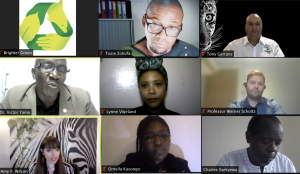
Engaging Academics to Counter the Growth of Factory Farming in Africa
 There is overwhelming consensus between environmental scientists, climate-conscious policymakers, and animal rights and welfare NGOs that the scale of our current food system is unsustainable and detrimental to the climate, biodiversity, and farmed animal welfare. Africa has a fast-growing livestock industry that is relying more heavily on the factory farming model as the African population quickly expands. Yet, limited research has been conducted on the impacts of factory farming in the sub-Saharan Africa region.
There is overwhelming consensus between environmental scientists, climate-conscious policymakers, and animal rights and welfare NGOs that the scale of our current food system is unsustainable and detrimental to the climate, biodiversity, and farmed animal welfare. Africa has a fast-growing livestock industry that is relying more heavily on the factory farming model as the African population quickly expands. Yet, limited research has been conducted on the impacts of factory farming in the sub-Saharan Africa region.
To address this issue, Brighter Green applied for and received a Fueling Advocates Initiative (FAI) grant from the Tiny Beam Fund. (For further information on this project, including the final report and notes from the May 20th, 2021 webinar, please visit brightergreen.org/africaff.) The FAI grant supports non-profit organizations addressing the negative impacts associated with global industrial animal agriculture, especially concerning low- and middle-income countries. The grant also has a focus on academic research as an important driver for change. With the crucial support of this grant, Brighter Green engaged academics, researchers, and local activists in dialogues to build an evidence-based case against the growth of the industrial livestock model in several sub-Saharan African countries. Brighter Green prioritized the voices of African academics and researchers to assure that their perspectives drive discourse and a forward-looking research agenda.
The project was led by Judy Bankman, Brighter Green Project Manager, based in the United States, and Judy Muriithi, Researcher, based in Kenya. The program kicked off with the 4th Annual Africa Animal Welfare Conference hosted by the African Network for Animal Welfare (ANAW) in September 2020. This was a fruitful opportunity to engage academics, advocates, and organizations interested in animal welfare, climate change, and sustainable agricultural practices. Judy Muriithi spoke on a panel hosted by Brighter Green Executive Director, Mia MacDonald, which focused on policy, innovation, research, and developing solutions to counter the growth of factory farming.
The first phase of this project involved conducting a literature review of existing research on the growth of factory farming in sub-Saharan Africa, reaching out to 40+ academics who provided resources and further contacts, and interviewing 12 experts. We found great interest in the topic by academics, many of whom work in diverse fields. Though we found limited academic research specifically on the impact of factory farming in Africa, we did encounter extensive adjacent research on related issues. These include the effectiveness of methods that may be considered alternatives to factory farming, such as organic agriculture and traditional or pastoral farming, and the use of livestock for poverty reduction and wealth creation.
For the second phase of this project, Brighter Green hosted a two-panel webinar on May 20th, 2021 in partnership with the University of the Western Cape of South Africa. We brought together academics, researchers, and advocates in a dialogue to discuss the impacts of factory farming on livelihoods and animal welfare.
Our research and discussions with panelists confirmed the multifold detrimental impacts of factory farming on animal welfare, the environment, and food security. We were pleased to encounter the high level of interest in this topic among researchers, and especially the critical, intersectional approach to this topic through University of Western Cape scholars.
Two major take-aways of this project were 1) centering African culture, traditional methods, landscape, and climate in order to combat factory farming and create solutions and alternatives is essential, and 2) a global perspective is needed in conjunction with an African-centric approach. This means it is necessary to connect Africa’s NGOs, policymakers, and academics with a global movement for animal welfare and the environment.
Another major outcome of this project has been the connections we facilitated across disciplines. This project brought together veterinarians, lawyers, academics, and advocates, some of whom were already connected, but many of whom engaged for the first time on a topic of shared interest and importance.
The FAI grant gave Brighter Green the opportunity to center academic research and perspectives in order to inform important advocacy work challenging factory farming, and has provided a foundation for future work on this topic.
To access the final report and notes from the May 20th, 2021 webinar, please visit brightergreen.org/africaff.
 Brighter Green
Brighter Green



